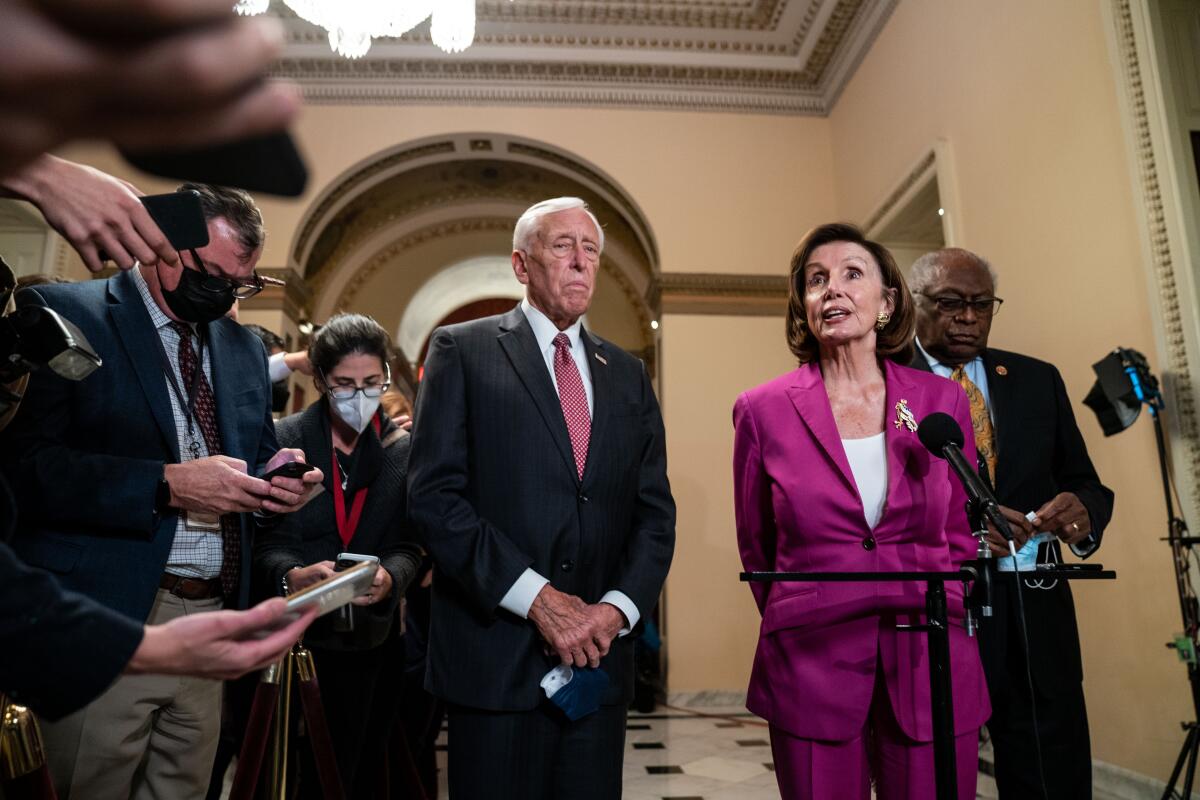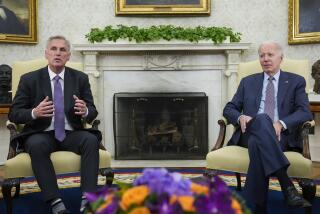House passes $1-trillion bipartisan infrastructure package

- Share via
WASHINGTON — The House passed a historic $1-trillion infrastructure package Friday night and voted to allow formal debate on a larger social spending and climate bill, a show of progress on President Biden’s agenda after months of division between centrists and progressives.
A planned final vote on the larger social spending bill was scuttled because a group of moderates — enough to block the measure — refused to support it until they had an official estimate of its economic cost.
The bipartisan vote on the infrastructure bill, which was approved 228 to 206, marks a badly needed show of momentum for Biden’s agenda, which has suffered setbacks because of a deep level of mistrust between centrists and progressives on Capitol Hill.
The vote came about Friday after a grueling week for Democrats in which their gubernatorial candidate lost in Virginia and frustrations over the slowing negotiations on Capitol Hill boiled over.
There was a growing sense among rank-and-file members that they needed to move forward on the bills after two prior attempts to schedule the votes failed.
For weeks, progressives blocked a vote on the infrastructure bill as leverage to ensure the Senate took strong action on the social spending bill. On Friday, progressives agreed to pass the infrastructure bill alone, mindful of the risk if they held out for too much.
“What am I going to do, you know — continue to drag this out?” said Rep. Raul M. Grijalva (D-Ariz.). “The risk of doing nothing, to me, is more profound than the sequence” of votes.
The $1-trillion infrastructure bill, which the Senate approved in August, will go to Biden’s desk for his signature. A White House spokesperson said Friday that Biden would sign it.
The infrastructure effort began in late March, when Biden announced plans to push for a major package, something that had eluded several of his predecessors.
For months, Biden and Senate Republicans negotiated a roads-and-bridges plan, allowing the president to flex the bipartisan bona fides he championed on the campaign trail. The bill passed overwhelmingly, 69 to 30, in the Senate.
Thirteen House Republicans joined Democrats on Friday in supporting the infrastructure bill. Six House Democrats voted against it.
While the infrastructure bill makes up only a portion of Biden’s agenda, it marks a huge new infusion of money. Infrastructure spending as a share of gross domestic product in the next five years will be about 1.5%, compared with 1.36% during the New Deal years, according to a Brookings Institution analysis of Office of Management and Budget data.
The bill addresses a wide range of infrastructure deficiencies and will expand the availability of broadband internet throughout the country.
About $110 billion will go to roads, bridges and other major surface transportation projects. Passenger rail will get $66 billion, public transit will get $39 billion, and safety programs for highways and pedestrian walkways will get $11 billion. About $55 billion will go to expanding access to clean drinking water.
While Democrats hailed the successful infrastructure vote, the achievement is largely overshadowed by the long and messy process of writing the social spending measure.
Congressional Democrats and Biden said Friday that they would move the bill through the House the week of Nov. 15. But disagreements over key issues like paid leave and immigration will need to be sorted out as the bill moves to the Senate.
While most major pieces of legislation suffer fits and starts during the legislative sausage-making, the frenetic negotiation over these bills has been particularly fraught, a reflection of the slim three-vote margin House Democrats hold.
The delay of the social spending vote in the House means it may not be able to get through the Senate until well into December.
With fear of a year-end negotiation in mind, members of the Congressional Black Caucus, who hold significant political sway, urged House Speaker Nancy Pelosi on Friday to hold the two votes as a show of progress. Moderates would only agree to that if the infrastructure vote was first, according to Democratic sources.
Though progressives allowed the infrastructure bill to pass before the social spending bill was done, they remain worried that moderate Democrats won’t support the current $1.85-trillion package.
With Biden helping over the phone, the centrist and progressive camps hatched a deal in which centrists agreed in writing to support the social spending bill in a floor vote the week of Nov. 15 as long as the official cost estimate matches expectations.
While the requirement that the cost must match the White House’s estimate leaves some wiggle room to not vote for the bill, the five centrists, including Reps. Josh Gottheimer (D-N.J.) and Stephanie Murphy (D-Fla.), said they would work to resolve any differences.
The statement is intended to assure progressives that the social spending bill will get through the House.
Biden telephoned into a multi-hour meeting of the Congressional Progressive Caucus on Friday and asked for its support, “subject to some assurances and commitments [from moderates] that he was working to get,” Rep. Jared Huffman (D-San Rafael) said before the deal was agreed to. “He’s working very hard to get everybody there.”
Biden has repeatedly promised progressives that he will deliver the votes in the Senate.
There is plenty of reason for progressives to be nervous. Centrist Democratic Sens. Joe Manchin III of West Virginia and Kyrsten Sinema of Arizona have already forced progressive priorities to be trimmed from the bill and have not publicly committed to supporting the latest version.
Times staff writer Nolan D. McCaskill contributed to this report.
More to Read
Get the L.A. Times Politics newsletter
Deeply reported insights into legislation, politics and policy from Sacramento, Washington and beyond. In your inbox three times per week.
You may occasionally receive promotional content from the Los Angeles Times.











